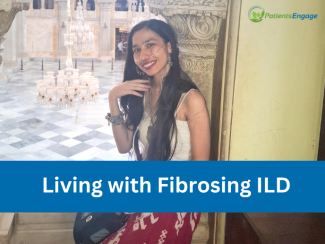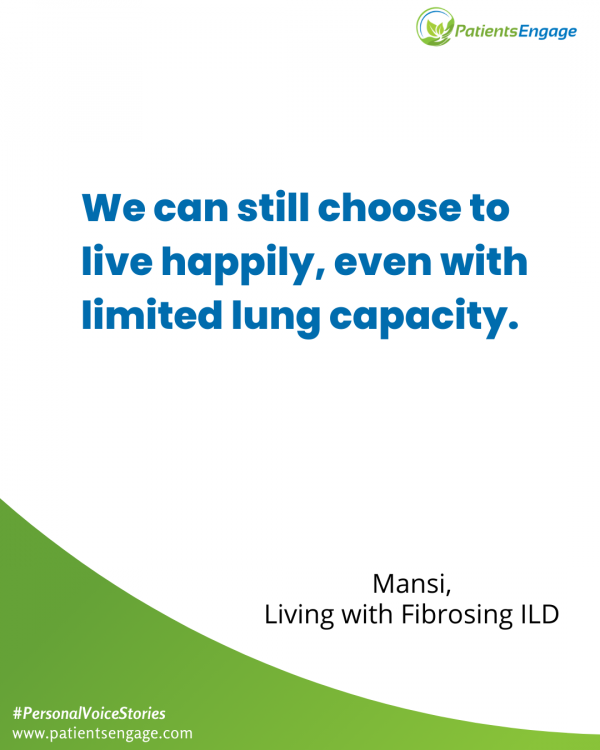
Mansi, 22 was still a teenager when she was first diagnosed with Fibrosing Interstitial Lung Disease. She feared it would limit her hopes and aspirations but over time, she has learned to carve her way around this debilitating disease. She shares her journey so far with Fibrosing ILD.
Please tell us a bit about your condition. Can you describe it?
I have Fibrosing ILD (Interstitial Lung Disease). It is scarring of the lung, which makes one have a chronic cough, experience breathlessness and fatigue.
When were you diagnosed?
I was diagnosed when I was 19 years old. Though certain Irregularities in my CT scan were found when I was 18.
What were the early symptoms? What made you go to a doctor?
A recurring chronic cough, which was not going away with the general medicines, and home remedies. This went on for 3-4 months. After spotting a little blood in cough, I reached out to a specialist in my hometown, who misdiagnosed the disease as TB. Unsatisfied with the diagnosis we reached out to a Pulmonologist in Mumbai.
First, we had an online consultation, after which we were asked to come to Mumbai with our reports. Mumbai, because it's the nearest metro to my hometown, and our relatives have had good experiences with that doctor.
What tests were done? How did the diagnosis come about?
X-ray, High-Res CT scans (HRCT), PFT (Pulmonary Function test), and some blood tests were done. The doctor in Mumbai was sure that my chronic cough was not because of Tb, but something else. The tests confirmed that I have ILD.
What was your reaction to the diagnosis? How and when did you break it to your family?
For a brief period, we were happy that it was not TB (Tuberculosis), as we were ignorant about ILD. Later on, when we realized that it didn't have a cure, and could be life limiting, it was a little difficult to accept.
My family has been extremely supportive but there are times when it gets overwhelming for them.
What happened next? (specialist referral, course of treatment etc.)
I was put on a dose of steroids by my treating pulmonologist, then came the anti-fibrotic drugs, which caused gastric issues. Now I am on steroids, anti-fibrotic drugs and immunosuppressants.
Have you tried complementary medicine or therapies, like homeopathy or ayurveda? If yes, did it help?
I did consult an ayurvedic practitioner. It didn't help, and exaggerated my condition.
What medications are currently on? Pls mention all allopathic, supplemental, herbal and any alternative medicines and indications of each.
Antifibrotic medication, Steroid, Mycophenolate Mofetil (an immunosuppressant drug), Calcium supplement, anti-ulcer medicine for GERD, and a monoclonal antibody to reduce inflammation in my lungs.
Were there any side-effects of the medicines? If yes, how do you manage them?
The anti-fibrotic drugs do cause gastric issues. Have been trying to manage the symptoms by trying to avoid certain foods, eating healthy, low spicy-less oily, and hygienic food. I wasn't suggested a particular diet or anything by my doctor.
Healthy entails food with sufficient amounts of protein, cooked hygienically, little to no junk.
What kind of specialists (including Physio/ Occupational therapist/ Psychiatrist etc.) do you consult and how often?
Pulmonologist, twice a year. Pulmonary physiotherapist, daily for the rehab. Online, an hour a day. It entails, breathing, strengthening and aerobic exercises.
Do you have a family history of this condition?
No.
What changes have you made to your lifestyles because of this condition?
I had to tone down my lifestyle to a slower pace, need to be really cautious about hygiene, cannot eat most food outside (which is difficult to manage since I live in a hostel, and have to depend on portable oxygen while walking. It did impact my college life for a semester when I got on oxygen, as my family was concerned about me staying in a hostel. While I did go back to campus for 2 weeks, I had to return back home because I couldn't manage well in hostel. I had to face administrative issues till the very end of the semester in order to be able to give exams. In the end it worked out.
With regards to friendships, I have realized now who are the people who would actually show up for me. I have lost quite a few friendships; some have started keeping a distance for certain reasons.
Eating healthy in hostel is difficult. I have managed to get my own cooking set-up, where I cook my own meals. I ensure to have enough protein and eggs, keep healthy snacks and fruits handy.
How did you mentally/emotionally cope with it all? Pls mention any specific times and issues that were difficult.
I try to keep myself busy with the things that I love to do, and keep myself engaged, so that I don't overthink. Presently, I need to use oxygen while walking. The coughing keeps coming and going. It's recurring. Some digestive issues because of the medications. A little fever and fatigue, at times. And rest all good.
When I had to start oxygen therapy, the way everyone looked at me because of the nasal cannula, seemed to bother me a lot. Also, not to mention the emotional toil it takes when you are chugging down tablets after tablets, and seem to not get better anytime. It is difficult, but accepting it and living with it, is the only choice ILD patients have.
Did you see a counselor for support? Were you offered counseling by your doctor?
Yes I did reach out to a counsellor on my own even though it was not suggested by my doctor. Things were getting emotionally overwhelming with regards to relationships, friendships, academics, career, and family. I have been doing online counselling and it has been helpful.
How has your family supported you? Who has been your biggest support/companion through it all?
My family has truly been supportive, whether it is with regards to my emotional well-being, or fun things I’d like to do, or supporting my education despite the risks of sending me away from home. My brother, in particular has been my biggest blessing since the very start, who does all that he can do, to be truly be there for me.
When did you break the news to your friends and distant relatives? How did they take it?
I had to talk about ILD when I started using portable oxygen while walking. Initially I seemed to receive support, but over time it has become just another issue for everyone. Sometimes with extended relatives, the uninvited unsolicited advice seems to be bother me. It does get extremely difficult to explain to people that there is no cure for the disease and only treatments.
Did you inform your college? If yes, how did they handle it?
I had to inform at my Educational institute, where I study, when I started using oxygen. Initially there were a lot of administrative hiccups, but now I think we have found a middle ground.
What were some of the challenges you faced?
It was most to do with their incapability to accommodate to my medical needs at that time. I had to struggle to access remote learning, but I think I have found a way.
The one thing you miss because of living with ILD?
I miss being certain about my future. I miss being not tied to a portable oxygen concentrator to do basic everyday tasks. I miss being carefree about the food I eat, places I visit, and activities I participate in just like my friends. I miss not having to take medicines, and being oblivious about how expensive it is to be sick. I really miss not feeling exhausted and tired.
What is your advice to patients who face similar challenges?
To keep going. To do pulmonary rehab, and ensure good protein intake. Try to keep yourself positive and hopeful. And keep themselves engaged in the things that they love to do. We can still choose to live happily, even with the limited lung capacity.

What are you worried about for the future?
Managing my career and academics, along with my condition, seems to worry at times, but I think I will find a way about that.
Another thing that bothers me, is the emotional and financial burden which me and my family would need to deal with, if a transplant has to happen.






